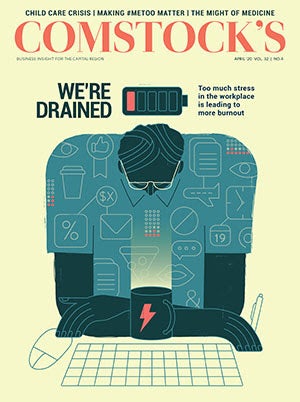The #MeToo movement sent shock waves through the nation in late 2017, forcing a reckoning over the extent to which sexual harassment and discrimination had pervaded the workplace and society at large. Now, more than two years later, it’s changing the law.
With federal action largely at a standstill, state lawmakers across the United States introduced hundreds of bills addressing sexual harassment in 2018 and 2019, according to the National Conference of State Legislatures. California is no exception — it’s adopted some of the biggest and most sweeping updates to employment law since the #MeToo movement began.
So what do the changes actually mean for employers and the workers the laws aim to protect? In some cases, it’s not so clear. Here’s a look at some of the most consequential — and controversial — updates to laws that have taken effect this year and how they stand to affect employers and their workers.
Click here to read more cover stories
ASSEMBLY BILL 51: A Ban on Forced Arbitration Is Held up in Court
Private arbitration has become an increasingly popular mechanism for companies looking to settle disputes out of court. One 2018 study by the Economic Policy Institute estimates that more than half of all nonunion private-sector employers require workers to resolve conflicts through the process, double the rate from the early 2000s. Among large companies, with at least 1,000 employees, that share jumps to roughly two-thirds.
For businesses, the benefits are clear: Arbitration is widely seen as less expensive, time-consuming and risky than bringing disputes to trial. But critics say such arbitration clauses give too big an advantage to the employer, including in cases of sexual harassment or discrimination. And since the start of the #MeToo movement, the use of such agreements has attracted new scrutiny. Public pressure prompted some major companies, including Google, to do away with the practice as early as 2018. California lawmakers followed with a ban of their own.
Previous pushes to prohibit employers from forcing employees to waive their rights to a trial were vetoed by former Gov. Jerry Brown. But Gov. Gavin Newsom signed a third push to pass the law, Assembly Bill 51, last year. The law, if enforced, would create huge changes for employers across the state, triggering new contracts and an overhaul of legal strategy for many companies. But, as expected, AB 51 was immediately challenged with a lawsuit from the California Chamber of Commerce and other opponents, claiming it violated the Federal Arbitration Act, a longtime federal law protecting the practice.
When someone experiences something like that, and then they either lose their job or they are disabled through trauma, it takes time to sort of get yourself situated financially, emotionally. It takes time to get yourself into a position where you even have the strength to focus. (Assembly Bill) 9 will give people the time to do it and figure it out.
Elizabeth L. Riles Executive board chair, California Employment Lawyers Association
“It doesn’t make sense to place businesses at risk for criminal penalties for a practice that has been favored by California and federal law, and consistently upheld by the courts,” CalChamber President and CEO Allan Zaremberg says in a news release. “While it may not serve the best interests of the trial lawyers, expeditious resolution through the arbitration process serves the interests of employees and employers.”
In February, Chief U.S. District Judge Kimberly J. Mueller agreed with the opposition, issuing a preliminary injunction blocking the law. Legal experts say the ruling shouldn’t have come as a surprise — courts have long been hesitant to allow states to interfere with the Federal Arbitration Act. Still, Francis J. Mootz III, an employment law expert and professor at McGeorge School of Law, believes this case could be appealed all the way to the U.S. Supreme Court. If that happens, an eventual ruling could end up strengthening businesses’ right to arbitration even more. “This case could be the next nail in the lid,” he says.
Some employers may decide to follow Google’s lead and do away with mandatory arbitration in light of public pressure. In the meantime, most California companies have been watching the case to see how it turns out, according to Michael Kalt, government affairs director for the California State Council of the Society for Human Resource Management. “Most of the employers I know were waiting and seeing because they felt pretty good about this law being struck down,” Kalt says.
ASSEMBLY BILL 9: Window for Filing Claims Is Extended to Three Years
Brittny McCarthy was an aspiring actress looking for work when director James Toback approached her in a Santa Monica bookstore and told her she looked perfect for a part. But the meeting that followed didn’t go as she was expecting. Instead of talking about roles, McCarthy says Toback tried to talk her into a sexual encounter and eventually stimulated himself in front of her.
McCarthy was traumatized by the 2008 incident. But it wasn’t until years later, when stories of misconduct surfaced in news reports, that she learned his conduct at an ostensible job interview violated state employment discrimination laws. The realization, she says, hit her like a “punch to the gut.”
“I didn’t realize it was a reportable offense or even protected under our sexual harassment laws,” she testified before lawmakers at a committee hearing.
Experts say it isn’t unusual for it to take months or even years for workers to recover from — and report — potential violations of sexual harassment and other employment discrimination statutes. But until this January, state law only provided a one-year window to file state claims that serve as precursors to civil lawsuits.
Assembly Bill 9, approved last year, changed that. Under the legislation, which supporters called a direct response to the #MeToo movement, workers now have up to three years to file a claim with the state Department of Fair Employment and Housing. Supporters say the change brings the statute of limitations for filing in line with other types of misconduct, such as medical malpractice or fraud.
“When someone experiences something like that, and then they either lose their job or they are disabled through trauma, it takes time to sort of get yourself situated financially, emotionally,” says Elizabeth L. Riles, an attorney who is executive board chair of the California Employment Lawyers Association. “It takes time to get yourself into a position where you even have the strength to focus. AB 9 will give people the time to do it and figure it out.”
The law isn’t retroactive, so it’s too early to gauge whether it will have an effect on the number of claims or eventual lawsuits filed. Riles says she doesn’t expect a “glut” of new cases, but she says the change will give employees and their attorneys more time to review and vet a potential claim, instead of rushing to meet a one-year deadline.
Mootz agrees that although it’s unlikely employees “will strategically wait around” to file a claim, the new deadline gives people more time to realize they have a viable claim and for attorneys to vet the cases. For employers, that extends a window of exposure when it comes to former workers. And it could translate to more vigilant record keeping.
A legitimate problem for employers is every employee who leaves their employ, they’re going to have to make sure they maintain the proper records for three years, because two years and 300 days later, someone could file a claim. It’s going to be kind of a hassle.
Francis J. Mootz IIIProfessor, McGeorge School of Law
“A legitimate problem for employers is every employee who leaves their employ, they’re going to have to make sure they maintain the proper records for three years, because two years and 300 days later, someone could file a claim,” Mootz says. “It’s going to be kind of a hassle.”
Kalt says in addition to record keeping, the change “underscores the need to know your supervisors are accurately documenting” issues or complaints with employees in real time. “You’re potentially dealing with claims that could be four years old (by the time it gets to court),” he says. “There’s a chance witnesses might not be there. Everyone likes an easy performance evaluation, but often it’s those hard ones (that matter).”
SENATE BILL 778: One-Year Delay for New Harassment Training Requirements
The #MeToo movement has sparked a new push for education about sexual harassment, and in California, more rigorous and widespread workplace training is now the law.
Companies with five or more workers must provide two hours of training for managers and one hour of training for nonsupervisory employers, according to legislation signed by Gov. Jerry Brown in 2018. That’s a big change from previous law, which required training only for supervisors and only for companies with 50 employees or more. And the training isn’t a one-time push; the law requires refresher courses every two years.
The new training minimums were set to take effect January 2020. But concerns from unprepared employers, and delays in state plans to develop an online training course to help small employers meet the mandate, prompted lawmakers to push the implementation back a year.
That means employers have until January 2021 to get their training programs up and running. The extent and cost of the change on companies will depend on their size and training needs, Kalt says. Smaller employers planning to send workers through the state’s online course should feel little effect, beyond the time workers spend completing the training. For larger companies that hire outside counsel or need more tailored training, the shift could be more costly.
Organizations such as CalChamber and private employment attorneys have created programs of their own to help members and clients comply with the new law. Even with the one-year delay, Kalt says to expect a fourth-quarter flurry of activity. “I suspect like everything else, people wait until the last minute,” Kalt says. “People will still be scrambling.”
More #MeToo Related Bills Expected
Experts expect more #MeToo related bills to flow from the Legislature in the months and years ahead. Democratic Assemblywoman Lorena Gonzalez, author of AB 51, has renewed her push to pass legislation that would hold employers responsible for harassment or discrimination against most contract and temporary workers. The bill, Assembly Bill 170, is named Sandra’s Law, for a woman who was fired after reporting sexual harassment by her supervisor while working as a subcontracted dishwasher at the Terranea Resort in Southern California.
“The transformative changes driven by the #MeToo movement have not made a difference in the lives of all women” Gonzalez says. “Janitors, hotel and restaurant workers, service workers, and immigrants continue to be exploited and harassed at work while their employers deny responsibility. Workplace protections should extend to all women, no matter their economic standing, access to an attorney or level of existing power.”
Kalt isn’t surprisd to see a new push to expand who is covered by sexual harassment laws. Other efforts, such as a requirement to provide paid time off for victims of sexual harassment, are expected to return to the spotlight. “California’s going to be busy, as always,” he says.
Mootz also sees ongoing efforts to help the law play “catch-up” to align with today’s standards. But even with statutory changes, he says some of the biggest shifts could come not from the Capitol or the courts, but from ongoing societal recognition of the issue.
“I think we’re now reaching a point where there’s going to be much greater recognition,” he says. “You don’t have to change the law but just better understand what gendered power dynamics are in the workplace and how to prevent it.”
—
Get feature stories like this delivered to your inbox: Subscribe to the Comstock’s newsletter today.
Recommended For You

Mending the Gap
In California, efforts to close the gender wage gap persist, despite the signing of The Equal Pay Act of 1963
Fifty-seven years after the Equal Pay Act was signed into law by President John F. Kennedy, women still earn substantially less than men. Legislation in California is attempting to level the playing field.

Sexism Is Not Extinct: What It Looks Like and How to Respond
Overt sexism still happens in the workplace, and male colleagues can help combat it.

Dilemma of the Month: Retaliating Against Whistleblowers
After an employee lodged an OSHA complaint against a company, his manager found a journal in the employee’s office that would make any reasonable person cringe in the era of #MeToo. Comstock’s columnist Suzanne Lucas explains why it’s still a bad idea to terminate the employee in this case.

We Need To Think of Diversity Not As Pushing Forward, But As Lifting Up
Some studies suggest women have better track records in finance, including investing in the stock market and managing hedge funds. Corporations who put us on their boards perform better. Perhaps it’s not entirely surprising for some, particularly from older generations, to wonder what the rest of us are still going on about.




